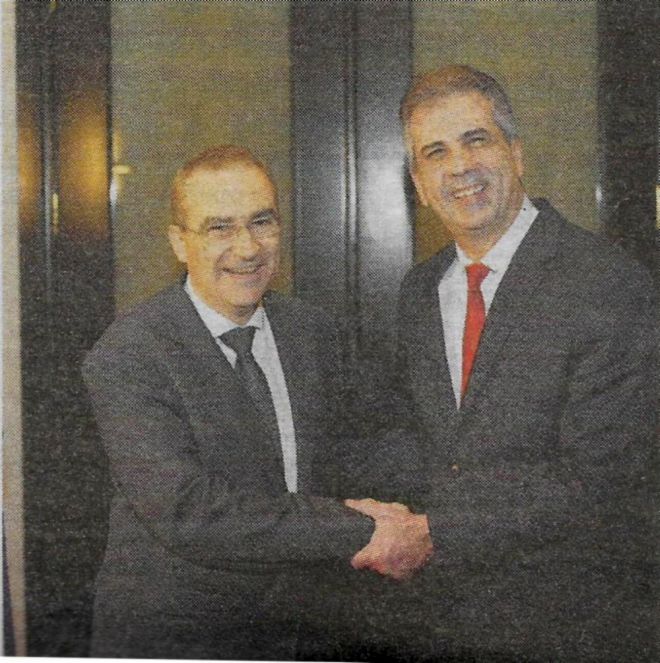  |
|
| |||||
This Google Custom Search looks only in this website. Is Europe Changing its Hostility to Israel for Friendship?
So many smiles around one table have not been seen for a long time, as were viewed two weeks ago in Brussels. It was extraordinary. There were top figures of the European Union on one side, and members of the delegation of the Israeli Foreign Ministry on the other. They were gathered for a diplomatic meeting, a friendly discussion, as was later defined by Foreign Minister Eli Cohen and his counterpart, Josef Borel as "the opening of a new page in relations between Israel and the European Union."
This meeting was diametrically opposed to the previous one between these two, and different from the phone conversation between Brussels and Yerushalaim two months ago which was initiated as a comment of Borel's view of IDF activities in reaction to terrorist attacks. When Eli Cohen criticized his words then, the talk reached high decibels and the talks broke down.
The recent meeting in Brussels, by contrast, was considered productive and concluded with the scheduling of a future meeting to be held between the two sides in Jerusalem.
+
We spoke with Ariel Kahana, the diplomatic correspondent of the newspaper Yisrael Hayom, who has been carefully following the recent developments.
What happened recently that caused a change is the European relationship?
OPINION
We innocently believed that the Hebrew language lost some of its vocabulary in the course of the time with the deceitful previous Israeli government rule, like "robbery of the public funds". That government signed an agreement with the Islamic Movement for an payments of tens of billions to the Arabs, without supervision or record-keeping, all for the promise that they would agree to lift their finger for the Lapid-Benet-Abbas government.
Benet's close advisor, who resigned in the course of his tenure, told that Yair Lapid carried "an open check" when he went to Kfar Kassam, to a meeting of the Islamic Council to ensure their support of the government. So one cannot call it robbery or blackmail but an alignment of terms, amending of conditions and repairing of discrepancies. Smooth words to cover up the biggest deception in the history of the State geared to buy votes with money, lots of it.
At the time, we thought, and even wrote, that the day would come when the treacherous government would collapse and in its stead, a government would emerge to right the budget chicanery against the chareidi sector. And the bandits would have some shame and revise their ugly lexicon of how to criticize payments to the chareidi community.
After all, they paid off the Arabs...
Part 5 (Conclusion)
This long series of articles was originally published in print in 1994, exactly 29 years ago. It describes the approach and feeling of certain representatives of the Zionist movement during the Holocaust. Sammy Kaufman argues that their behavior was influenced by their political desires to achieve a Jewish state, and their assessment that Jewish sacrifices in the war will make achievement of that goal more likely.
The first part of this series discussed the situation that prevailed in Slovakia at the beginning of the war, as the Germans began to ship Jews off to the death camps. Jews from all groups and backgrounds united against the common danger, forming the Working Group to save Jews. They found that Jewish lives could be bought fairly cheaply and they appealed to Jewish organizations all over for the funds. Some expressed concern about sending money that would aid the enemy. Others had more "ideological" grounds, as we will see in this part.
Writing after the war, Rav Weissmandel recalled the stunning response of Nathan Schwalb, the Zionist representative of the Hechalutz movement, who was sent to Europe to help his fellows. By "fellows" Schwalb only meant Zionists and the Zionist cause, as we will see herein.
In the last installment (part 2), we saw that Nathan Schwalb did not deny writing the letter until 1987, more than twenty-five years after if was first published by Rabbi Weissmandel in his book, Min HaMeitzar. In an interview, he claimed that the letter was a fabrication, and that he had not heard of it until then. He also denied knowledge of the work of earlier researchers on the Holocaust.
Researcher Kaufman contacted the others who worked in the field, and all claimed to have met Schwalb in the course of their work. Kaufman concluded that Schwalb lied to him in the interview. To weigh the plausibility that Rabbi Weissmandel made up the letter or did not accurately remember it, he brings a short biography of and testimonials to Rabbi Weissmandel's memory and intellectual integrity.
* * *
Outstanding Articles From Our Archives
Home and Family
by Rebbetzin Nomi Travis
Question:
You write repeatedly about the importance of asking shailas to poskim. I am in no way contesting their authority - their greatness is beyond our comprehension. I was just amazed by a gadol's unyielding reply that it was not my zivug to a shidduch I was considering. Why didn't he say, "I don't recommend," rather than to strongly reinforce that the match is not "made in Heaven?" How could he shoulder the responsibility of what Hashem has in mind for me?
Answer:
Although the sages' "greatness is beyond our comprehension," its practical application is not always obvious. We know that their understanding of life stems from objectivity and clarity of toiling in Torah. At the same time, Hashem grants them Divine assistance. Because we are only given counted minutes, we are often left with short sentences. Usually we don't grasp their reasoning. So how do we understand and apply their firm directives?
Home and Family
by Yisca Shimoni
Young Faiga, the bread baker, wife of the tailor, R' Shlomo Zalman, woke up at the crack of dawn. She had to finish shaping the dough she had prepared the night before into loaves and to slip them into the hot oven. The bread had to be baked before her regular early morning customers appeared. She was eager to finish up so that she could get back to her children, feed them and send them off to cheder with her warm blessings.
Her youngest son, Yeruchom Yehuda Leib, would soon wake up and she wished to give him all of her attention. She loved this precocious child dearly and felt that someday he would become a great Torah scholar. But she had to do her bit. [In fact, in later years, he was to be known as the `Godol of Minsk.']
While her hands were busy with the familiar work, she thought about her daily routine and the many hours she had to devote to this difficult work of baking and selling the loaves. "We hardly eke out a living from this," she sighed, "but at least we never lack bread, and that is blessing enough. I have nothing to complain about."
Flushed by the heat of the burning oven, Faiga did not realize how freezing cold it was outside, until she suddenly felt a sharp draft at her back as the door opened slightly and the chill and wind from the street hit her. She glanced backward to see her first customer. A young woman stood by the bread box, shivering uncontrollably as she looked ravenously at the first batch of hot loaves freshly out of the oven. Faiga's back was turned to her but she had caught a glimpse of the woman, dressed in a thin housedress and an old, tattered blanket wrapped tightly around her which was obviously not doing much to keep out the intense cold. Faiga glanced at the woman who looked familiar, but she couldn't recall her name.
Faiga now had to quickly remove a batch of loaves from the oven. She couldn't help noticing from the corner of her eye how the woman surreptitiously extracted one loaf, placed it in her shopping bag, and covered it with a ready towel she had brought.
|
|||||




.jpg)


